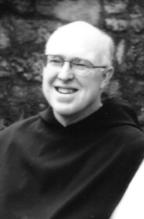Pentecost Sunday
[Scripture Readings: Acts 2:1-11; 1 Cor 12:3b-7, 12-13; Jn 20:19-23 ]
 Brother Joseph if you are like me you probably do not read everything on our community bulletin board. Some items have been posted for months and months and go by unnoticed for years. I wonder did you notice the quote from St. Raphael that is posted just above the Pope’s monthly prayer intention. I see it almost every day but it never registered with me until Friday. For those who do not know him Raphael was a monk of San Isidro in Spain. He studied as an architect and artist before becoming a monk and died in 1938 at the age of 27.
Brother Joseph if you are like me you probably do not read everything on our community bulletin board. Some items have been posted for months and months and go by unnoticed for years. I wonder did you notice the quote from St. Raphael that is posted just above the Pope’s monthly prayer intention. I see it almost every day but it never registered with me until Friday. For those who do not know him Raphael was a monk of San Isidro in Spain. He studied as an architect and artist before becoming a monk and died in 1938 at the age of 27.
Here is what he says about his monastic experience, “Enclosed in a monastery and at the feet of a crucifix I have infinite freedom, I have heaven, I have God”, Br. Joseph this is a remarkable statement and I hope it will be your monastic experience as you become a full member of our community. You have a coincidence of opposites here—enclosure and freedom occupying the same place; you have the cross and heaven at the same time. When St. Aelred says we make profession on the cross and that Our Order is the cross of Christ he includes all these paradoxes. The monastic life you are embracing Joseph is a mystery. Living out a mystery makes one very vulnerable to criticism to those who do not understand our life. Why do you live this way, what do you achieve by hiding away in a monastery, what good does it do society? One time our Abbot General was here and a reporter did an article on him for the local paper and asked him what good does our life do for society? Without missing a beat he said, “It keeps us off the streets!” There are no satisfying answers to these question but they are not new. A document called the Little Exordium, which goes back to the 12th century, speaks about our predecessors in the monastic life, “These are the poor men of Christ. They have no defense against their attackers either through riches or through power, but they place all their hope in the mercy of God.” (Exordium Parvum #12.)

Br. Joseph you are joining the poor men of Christ and are placing all your hope in the mercy of God. In a few minutes after you pronounce your vows you will sing three time, “Receive me, 0 Lord according to your word and I shall live; do not disappoint me in my hope”. St. Paul reminds us that hoping for what we cannot see means awaiting it with patient endurance (Romans 8). To live by hope in patience endurance is to live between the present and the future. It is not a comfortable place to live. You do not yet possess what you hope for so you are for awhile empty handed. The motto of our Abbey is “Vacate et Videte” a phrase from Psalm 45 (46), which translates, “Be empty and see.” What does being empty have to do with seeing? What do you see by not seeing? At the Ascension Jesus left the sight of the apostles, he disappeared. The Apostles lost sight of Jesus but they were given a vision. A vision is like a dream, something to strive for as when Martin Luther King said, “I have a dream.” A dream, a vision, a hope can be the driving force of one’s life. Br. Joseph make your passion, your hope the Cross of Christ. The cowl you are about to receive signifies the cross. The cross is our sign of victory of life over death. St. Aelred wrote, “Let the cross of Christ be a mirror for you. In the cross of Christ let each person examine his life, whether the way they live conforms to the cross of Christ” (Homily 10, Palm Sunday).
St. Benedict sums up the monastic life as a search for God but none of us has seen God. Living on the hope of seeing God face to face, as has been promised us, is to live in suspension, hanging as it were between heaven and earth. This is our cross. But there is a point where emptiness is fulfillment, where poverty is wealth, where learned ignorance is deep knowledge, where enclosure is infinite freedom.
